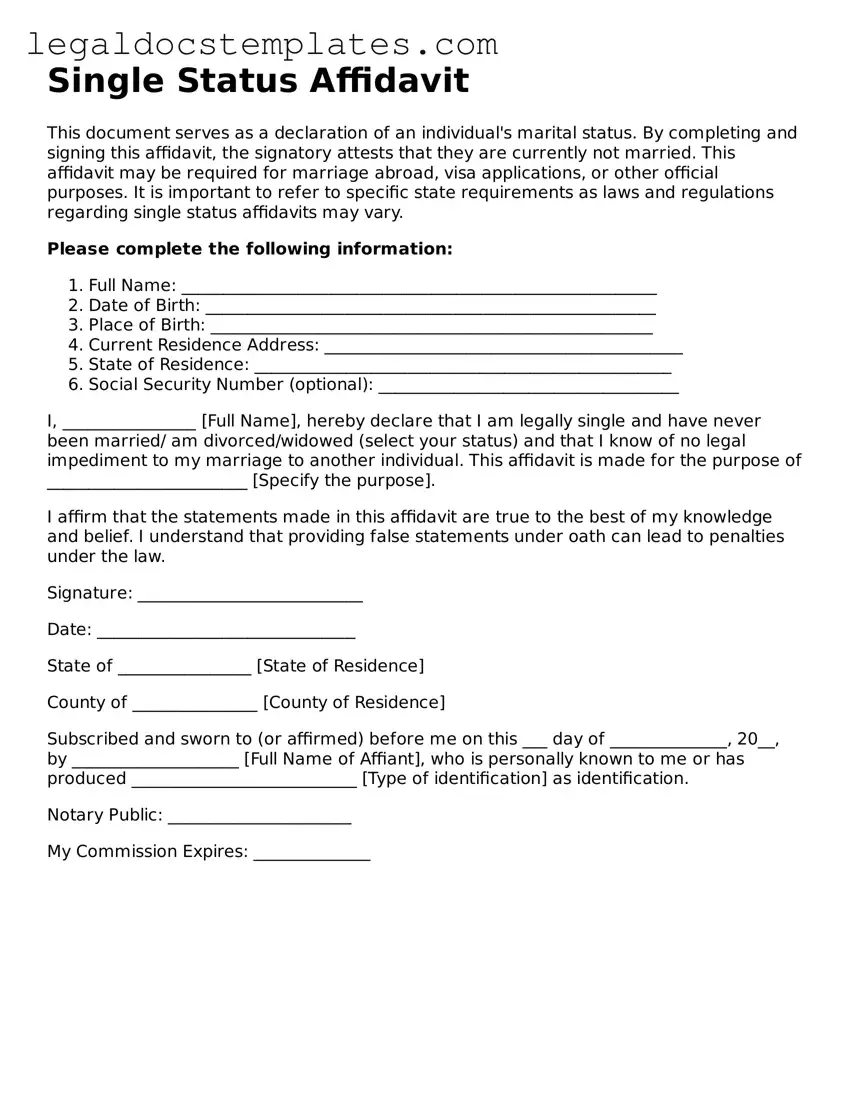The No Impediment to Marry Certificate closely resembles the Single Status Affidavit, serving as a declaration that there are no legal obstacles to an individual's capacity to marry. Both documents are essential for those intending to marry abroad, ensuring that the individuals are legally free to enter into marriage. They are often requested by foreign governments or legal authorities to validate the marital status of an individual, providing a layer of legal assurance that no existing marital bonds preclude a new marriage.
Similarly, the Certificate of No Record of Marriage functions akin to the Single Status Affidavit, as it is official proof provided by a state or government entity affirming that, after diligent search, no marriage record has been found for the individual in question within a specified period. This document is vital for validating one's marital status, especially when required by foreign governments for marriage, immigration, or other legal processes, emphasizing the lack of any registered marital bonds that could impede legal proceedings.
The Affidavit of Free Will is another document that echoes the Single Status Affidavit, emphasizing an individual's voluntary intention to enter into a marriage without any coercion or impediment. This affidavit is particularly significant in jurisdictions where consent is a critical condition for the recognition of a marriage. It reassures the concerned authorities that the decision to marry is made independently and freely, paralleling the purpose of ensuring the individual's eligibility for marriage.
The Declaration of Nullity of Marriage shares a conceptual similarity with the Single Status Affidavit by clarifying an individual's marital status. It is a legal document issued by a court or competent authority, declaring a previous marriage null and void, effectively restoring the individual's single status. This process is crucial for individuals seeking to remarry, as it legally affirms their eligibility to form a new marital union.
A Divorce Decree is another legal document that relates to the Single Status Affidavit by formally documenting the dissolution of a marriage. It officially alters an individual's marital status to single, making them legally free to marry again. Both documents serve the fundamental purpose of certifying an individual's current marital status, facilitating legal and social processes that require this specific personal information.
The Declaration of Civil Status operates in much the same way as a Single Status Affidavit by officially stating an individual's current marital status, whether single, divorced, widowed, or separated. It is often required for legal, social, and administrative procedures, serving as a formal acknowledgment of a person's civil status and eligibility for certain legal actions, including entering into a marriage contract.
The Marriage License Application, while primarily a request for permission to marry, indirectly confirms an individual's single or legally free-to-marry status similar to a Single Status Affidavit. Applicants must usually declare they are not currently married, or if previously married, that they are divorced or widowed, thus legally eligible to enter into a new marriage. This process ensures that all parties understand the legal responsibilities and statuses involved in marriage.
An Annulment Certificate, much like the Single Status Affidavit, serves as proof that an individual's previous marriage has been legally voided and that they are free to marry again. The annulment process legally erases the marriage as if it never occurred, thereby reinstating the individual's single status. This document is critical for those who intend to remarry and need to demonstrate their legal capability to do so.
A Legal Separation Agreement also shares similarities with the Single Status Affidavit as it formally documents the separation of a married couple, often as a precursor to divorce. While it doesn't dissolve the marriage, it outlines the rights and duties of each spouse during the separation and is necessary for those who wish to marry again post-divorce. It marks the transition of marital status leading towards singlehood, providing documented evidence of the individual's current marital situation.
Last but not least, the Cohabitation Agreement, though primarily concerned with the rights and responsibilities of two individuals living together without being married, indirectly supports the assertion of being legally single similar to what a Single Status Affidavit does. By formalizing the living arrangement without the bonds of marriage, it reaffirms the individuals' single status while outlining their mutual understanding, which is significant for legal clarity and personal reassurance in various social and legal contexts.

